We may not have the course you’re looking for. If you enquire or give us a call on +1 7204454674 and speak to our training experts, we may still be able to help with your training requirements.
Training Outcomes Within Your Budget!
We ensure quality, budget-alignment, and timely delivery by our expert instructors.

HR Managers go beyond just a profession. They form the pivot to shaping the organisation and taking it towards a progression pathway. However, the aim of this blog is to make you understand the HR Manager Salary. Based on a report, the average salary for an HR Manager in the UK in 2024 is approximately £47,600 per year, significantly higher than the UK's national average salary.
However, despite these figures, there is growing concern that HR professionals are underpaid for the breadth of their roles. This is applicable by considering inflation and the increasing demand for HR to take complex issues into account, such as talent shortages, remote work policies, and employee well-being. In this blog, we will unravel the insights on HR Manager Salary, the factors impacting it, and the career prospects. Let’s chart our insightful journey!
Table of Contents
1) What Does the HR Manager do?
2) Average Salary of HR Manager
3) HR Manager Salary Based on Experience Level
4) Factors Impacting HR Manager Salaries
5) Salary of HR Managers in Leading Companies
6) Human Resources Manager Career Prospects
7) Conclusion
What Does the HR Manager Do?
An HR Manager is a critical profession for ensuring that the organisation’s human capital is managed effectively, contributing to both employee satisfaction and organisational success. Listed below are some of the responsibilities of the HR Manager:
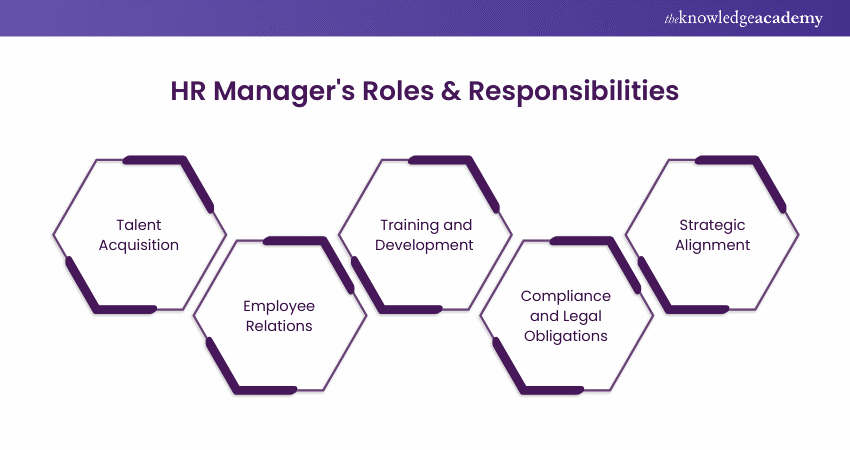
1) Talent Acquisition: An HR Manager is responsible for recruiting, sourcing, conducting interviews, and selecting candidates to ensure that a continuous flow of qualified and deserving Employees enters the organisation. This helps maintain a strong workforce aligned with the company’s needs.
2) Employee Relations: They play a crucial role in managing Employee Relations by identifying and resolving workplace issues, maintaining discipline, and ensuring a harmonious work environment. They work to correct problems and report on employee well-being and organisational dynamics.
3) Training and Development: HR Managers oversee training and development programs to ensure that employees continuously thrive and develop the necessary skills to perform efficiently. This responsibility is key to improving productivity and fostering long-term Employee Engagement.
4) Compliance and Legal Obligations: It is the HR Manager's duty to ensure that the organisation complies with employment laws and regulations. This helps the company avoid legal penalties and ensures that it maintains a positive reputation with both employees and external Stakeholders.
5) Strategic Alignment: They collaborate with senior management to identify strategic goals and ensure that human resource practices align with the company’s objectives. They assess workforce strengths and formulate policies that drive employee productivity and support overall business success.
Average Salary of HR Manager
The HR Manager Salary varies significantly based on geographic location, industry, and experience. The following table offers a more detailed and comprehensive understanding of their Pay scale.
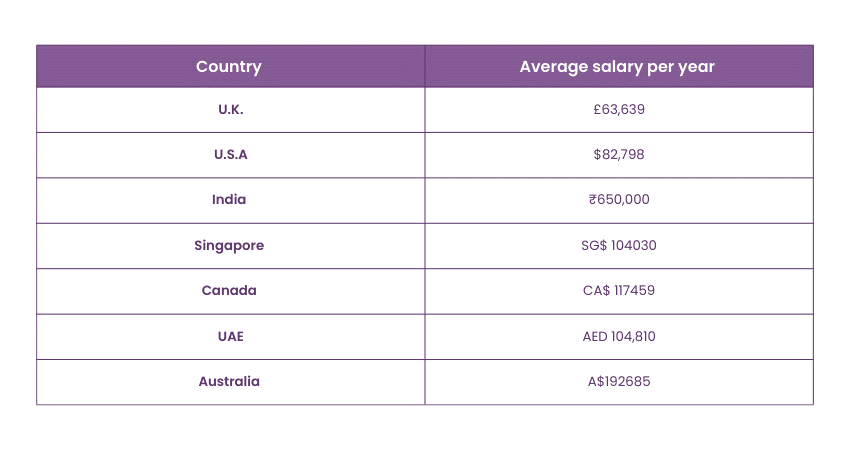
HR Manager Salary Based on Experience Level
Like other professions, HR Manager salaries vary according to experience.
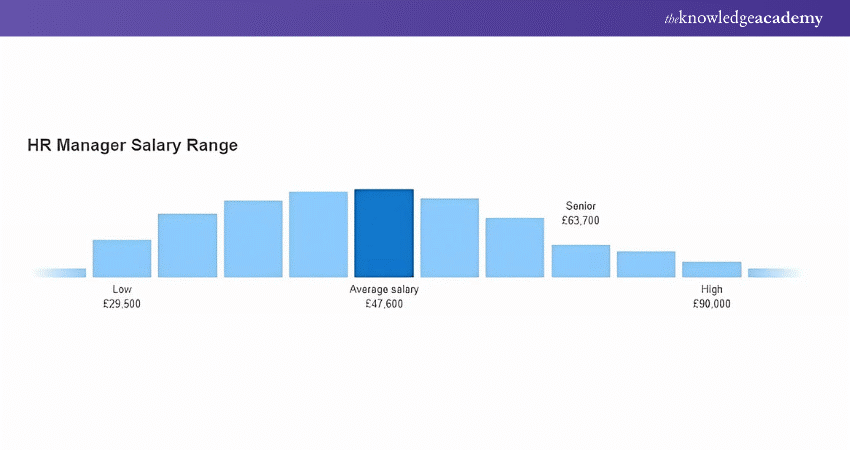
For a professional who has just entered this domain, the average salary could be anywhere around £29,500 to £90,000 for the most experienced professionals with 10+ years of experience. To provide a clearer understanding, we have created a table below:
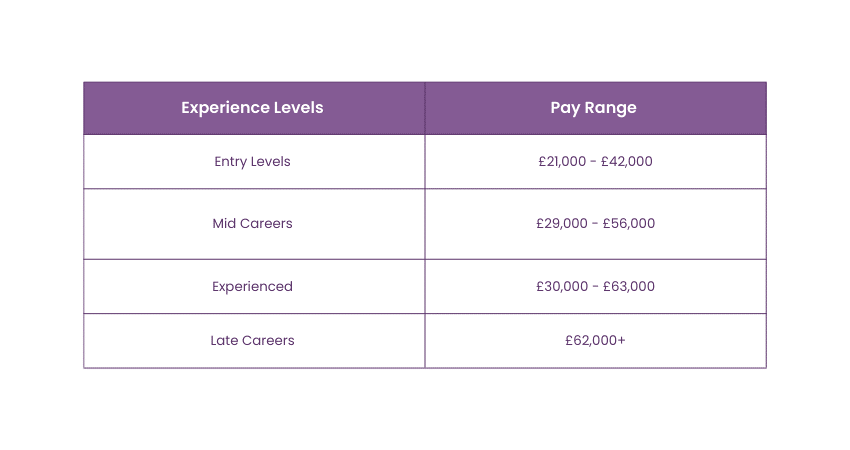
Ref: PayScale
Factors Impacting HR Manager Salaries
The HR Manager Salary is influenced by a range of variables, from geographic location to industry type, alongside their experience and specialised skillsets. Learning about these factors is crucial for both aspiring and current HR professionals aiming to maximise their earning potential. Below, we have described some of the factors that are impacting the salaries of HR Managers:
1) Location
The physical location majorly affects the salary paid to HR Managers. This is particularly predom in areas where the cost of living is relatively high. Therefore, the individual is expected to earn more to cover the expenses.
In contrast, salaries are generally lower in small towns or regions with lower living standards. Moreover, as employing HR Specialists can be region-dependent. For this reason, some disparities in remuneration can be expected.
Unlock the Labour Laws with our comprehensive UAE Labour Law Training- register now!
2) Experience
Experience is another crucial factor that influences the salary of a Human Resource Manager. Qualified professionals who have worked for several years in the field are often paid more because they offer expertise and documented performance. It implies that entry-level HR Managers can receive a relatively lower salary package, but as they progress in their careers, their pay significantly rises.
3) Areas of Specialisation
Key specialisations, ranging from talent acquisition to compensation and benefits, also impact the HR Managers' salaries. These specific skills are appreciated and can lead to better job opportunities.
For instance, an HR Manager with knowledge and experience in designing compensation frameworks or conducting labour relations can be worth more to an organisation than their pay is worth.
4) Industry Type
The industry an HR Manager works in directly determines their salary. Technology, finance, and healthcare sectors often provide higher compensation compared to retail and non-profit organisations.
5) Certifications
An HR Manager can improve the remunerative potential by getting specific certifications and recognitions. Professional certifications, including the Professional in Human Resources (PHR) or Senior Professional in Human Resources (SPHR), are required to prove their specialist’s eligibility and commitment to the HR field.
These credentials can help an HR Manager be more valuable to employers and boost their ability to obtain better-paid positions. These credentials further prove their dedication to the profession and effort to improve knowledge.
Salary of HR Managers in Leading Companies
To gain a deeper understanding of how HR Manager salaries vary across different organisations, it’s essential to consider the company’s size, industry, and location. These factors can significantly influence compensation levels, particularly in competitive sectors like technology and finance. Here is a table of salary of HR Managers in leading companies:
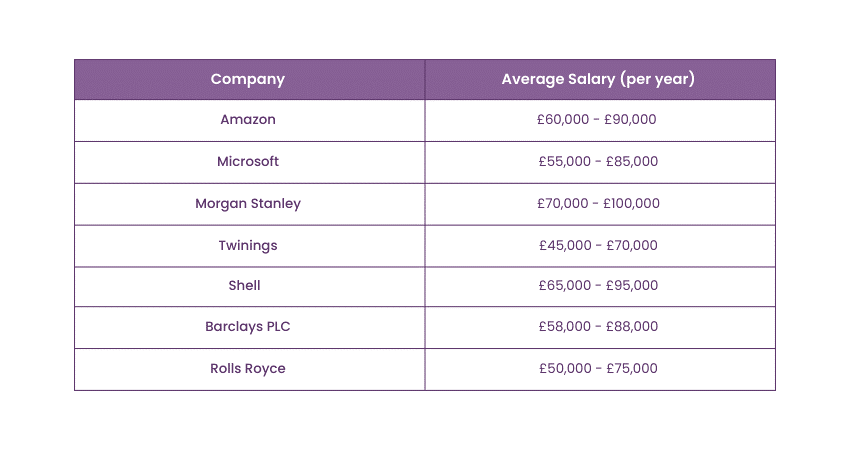
Source: Glassdoor
Human Resources Manager Career Prospects
As HR Managers advance in their careers, they often have the opportunity to take on more strategic and influential roles within the organisation. These career paths allow HR professionals to expand their responsibilities and expertise while contributing significantly to business success. Let's have a look at some of the career prospects of an HR Manager:
Senior HR Manager
A Senior HR Manager has extensive experience across various HR disciplines and typically deals with managing the HR department or several HR functions. This role majorly covers managing the Human Resources department, forming policies, and adhering to the firm's strategic direction. Moreover, senior HR Managers play a critical role in supervising other HR Employees and cooperating with executives to solve intricate HR issues.
Gain practical HR Decision-making skills with our HR Skills For Non-HR Managers Training- register today!
Vice President of Human Resources (HR)
The Vice-President of HR is a strategic position within the organisation that focuses primarily on making executive decisions. They are majorly responsible for defining the company’s overall vision for HR and ensuring that vision aligns with the company’s goals and objectives. Moreover, this position involves managing all aspects of Human Resources, including staff acquisition, development, remuneration, welfare, and legal matters. The Vice President of HR works with the CEO and other senior management personnel to ensure organisational transformation and a positive organisational climate.
Lead HR Manager
A Lead HR Manager is a professional who primarily supervises and directs a group of HR Specialists and managers. This role entails ensuring all HR initiatives are on track, and the team is aligned with the set objectives. The Lead HR Manager can also act as a role model and an advisor for junior HR employees. They are also responsible for strategic HR planning and business partnering to ensure the HR function supports the enterprise's objectives.
Head HR Manager
The Head HR Manager is a strategic position in any organisation that handles the Human Resources function in an organisation. This position typically involves providing strategic direction and operational leadership in the area of Strategic Human Resources Management. They majorly supervise all Human Resources tasks, including employment, training, and employee evaluation. They also ensure compliance with labour laws and regulations and strive to promote and establish an environment that supports diversity and inclusion within the workplace.
Assistant Director of HR
The Assistant Director of HR plays a key role in assisting the Director of HR in administering the Human Resource department and executing organisational Human Resource plans. This role also focuses on specific areas of HR, including employee relations, benefits, recruiting, and staffing. Additionally, they are also involved in formulating and implementing HR policies, strategies, and guidelines. The candidate for this position should have good leadership skills and be able to multitask while handling several HR projects.
Conclusion
We hope you understood the ‘HR Manager Salary’ topic. Understanding these factors enables you to strategically plan your career path after qualification. For those with a strong interest in HR, there are numerous opportunities for professional development and growth. With dedication and commitment, a career in Human Resources can lead to significant achievements and valuable experiences.
Unlock your digital proficiency with our Digital Transformation In HR Training - Sign up now!
Frequently Asked Questions

HR professionals should possess strong communication skills, emotional intelligence, problem-solving abilities, and a deep understanding of employment laws. They should also be proficient in leadership, conflict resolution, and adaptability, which are diverse teams that drive organisational success.

An HR Manager's common weakness is balancing empathy with enforcing policies. They must be able to manage conflicts and enforce rules, which can create tension between being approachable and maintaining authority. Additionally, the high volume of administrative tasks can hinder their strategic focus, affecting long-term planning.

The Knowledge Academy takes global learning to new heights, offering over 30,000 online courses across 490+ locations in 220 countries. This expansive reach ensures accessibility and convenience for learners worldwide.
Alongside our diverse Online Course Catalogue, encompassing 17 major categories, we go the extra mile by providing a plethora of free educational Online Resources like News updates, Blogs, videos, webinars, and interview questions. Tailoring learning experiences further, professionals can maximise value with customisable Course Bundles of TKA.

The Knowledge Academy’s Knowledge Pass, a prepaid voucher, adds another layer of flexibility, allowing course bookings over a 12-month period. Join us on a journey where education knows no bounds.

The Knowledge Academy offers various Employment Law Courses, including Employment Law Training, UAE Labour Law Training, and Commercial Law Training Course. These courses cater to different skill levels, providing comprehensive insights into Top 20+ HR Interview Questions with Answers.
Our HR Resources Blogs cover a range of topics related to human resource management and leadership, offering valuable resources, best practices, and industry insights. Whether you are a beginner or looking to advance your HR skills, The Knowledge Academy's diverse courses and informative blogs have got you covered.







 Top Rated Course
Top Rated Course




 If you wish to make any changes to your course, please
If you wish to make any changes to your course, please


